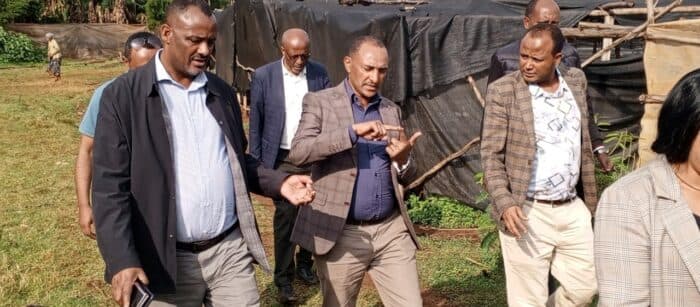Brazil’s coffee producers are increasingly relying on costly irrigation systems to safeguard yields and meet rising global demand, according to a detailed report by Reuters published on March 31, 2025. The shift comes in response to erratic rainfall and prolonged droughts that have significantly impacted the country’s coffee-growing regions over recent years.
Citing interviews with over 20 farmers, agronomists, and industry stakeholders, Reuters noted that irrigation is becoming a crucial factor in coffee production, especially in emerging areas like western Bahia—Brazil’s new agricultural frontier. Large farms equipped with advanced irrigation systems, such as central pivot and drip technologies, are now playing a central role in maintaining Brazil’s position as the world’s top coffee supplier.
One such example is the Joha farm in Bahia, operated by Rodrigo Brondani and owned by agricultural holding AFB&IOB. The farm spans 900 hectares of irrigated coffee fields and is projected to yield up to 80 bags per hectare—twice the national average. At current prices, the farm’s last harvest alone could be worth approximately $17 million, Reuters reported.
Brondani told Reuters that irrigation was key to the farm’s resilience amid Brazil’s changing climate conditions. His comments echo a broader trend, as many producers are now moving away from traditional rain-fed coffee farming and investing heavily in water infrastructure to ensure stable output.

Coffee Deficit, Soaring Prices
Brazil accounts for roughly 35% of global coffee consumption. Yet, prolonged droughts and declining yields have caused significant supply deficits. According to the Reuters report, 2025 is expected to mark the fourth time in six years that global coffee consumption has outpaced production. Data from the International Coffee Organization (ICO) shows a cumulative deficit of 12.5 million bags since 2022—equivalent to about 7% of the global annual supply.
These imbalances have pushed Arabica futures to record highs. Reuters cited market data showing a 70% surge in 2024 followed by another 25% increase so far in 2025. The benchmark price reached $4.40 per pound in February, prompting major brands such as Starbucks, Nespresso, and JDE Peet to raise consumer prices—with more hikes expected.
Water Access: A Dividing Line in Production
While water is relatively abundant in Bahia, where the Urucuia aquifer lies just 20 meters below the surface, regions like Minas Gerais face mounting challenges. Reuters noted that in some areas, farmers must drill as deep as 300 meters to access groundwater—an expensive and sometimes unreliable endeavor.
In 2024, several municipalities in Minas Gerais imposed restrictions on irrigation due to falling water levels. One farmer, Mario Alvarenga, told Reuters that despite owning an irrigation system, he was unable to use it because of water scarcity.
Data from Fundação Procafé, a Brazilian coffee research institute cited in the report, revealed a severe soil moisture deficit of 300 mm in Minas Gerais in October 2024—far above the long-term average.

High Costs and Technological Shifts
According to Reuters, the cost of installing a central pivot irrigation system can exceed 1.5 million reais (approximately $263,000). Drip irrigation systems, though more efficient, can cost around 40,000 reais ($7,000) per hectare. These costs are significant for small and mid-sized farmers, many of whom are still recovering from years of low coffee prices.
To address this, Cooxupé, the world’s largest coffee cooperative, has partnered with Israeli firm Netafim to facilitate irrigation access through payment plans involving future coffee deliveries. Cooxupé President Carlos Augusto Rodrigues de Melo told Reuters he expects the proportion of irrigated farms within the co-op’s network to double in the next three to five years.
Agronomists quoted in the report also emphasized the importance of regenerative practices—such as soil enrichment and tree renewal—to enhance moisture retention and productivity in tandem with irrigation.
Environmental Concerns and Regulation Gaps
While irrigation has helped stabilize production, it raises sustainability concerns. The Reuters investigation highlighted the risks of over-extracting groundwater, particularly in western Bahia. A study conducted by non-profit Imaterra and the Federal University of Bahia found that local authorities have relaxed water-use regulations, potentially leading to unsustainable practices.
The study reported that agriculture in Bahia uses around 17 billion liters of water per day—enough to supply nine times the population of São Paulo. Between 2002 and 2021, the Urucuia aquifer lost 31 cubic kilometers of water, according to Brazil’s Geological Service, largely due to agricultural use.
Experts interviewed by Reuters urged the government to enhance water monitoring systems, particularly in areas of rapid agricultural expansion.

Conclusion
The Reuters report paints a clear picture: Brazil’s coffee sector is undergoing a structural transformation. While large-scale irrigated farms in regions like Bahia are thriving, traditional producers in drought-affected areas face mounting challenges. As global coffee demand continues to rise, the country’s ability to sustainably manage its water resources may determine its future as a coffee powerhouse.

